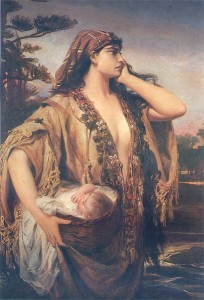The Lilith Blog 1 of 2
January 28, 2014 by Erika Dreifus
A Not-So-Modest Proposal: Add Another Matriarch to the Mix

“Moses and Jochebed” by Pedro Américo, 1884.
We honor four biblical “matriarchs”: Sarah, Rebecca, Leah and Rachel. And they’re important, even if we recognize them mainly, if not solely, for the sons they birthed.
But they weren’t always admirable. Take Sarah’s treatment of Hagar and Ishmael. Or Rebecca’s devious plan to trick her husband into giving their son Esau’s birthright to their other son, Jacob. True, Jacob got his comeuppance when Leah, disguised as the sister he wanted to wed, married him in Rachel’s place. As for Rachel, it’s hard to know what actions she might have taken, had she survived Benjamin’s birth. We do know that she was susceptible to jealousy.
For these reasons—plus others I’ll list shortly—I propose that we add a fifth matriarch: Jochebed.
I’m not unbiased. “Jochebed” is my Hebrew name (after my mother’s maternal grandmother). As a child, I learned that we (my great-grandmother and I) shared this name with a biblical foremother. But all I knew about the original Jochebed, gleaned from Bible Stories for Jewish Children, was that 1) she was the mother of Moses and his also-impressive siblings, Aaron and Miriam, and 2) she saved Moses’s life by setting him afloat for Pharaoh’s daughter to discover and adopt.
Which might be sufficient to elevate Jochebed to official Matriarch status. But my recent research on biblical Jochebed makes her case even stronger:
- Jochebed, daughter of Levi, was one of Jacob’s (and Leah’s) granddaughters—and a special one. As Tamar Kadari has noted for Jewish Women: A Comprehensive Historical Encyclopedia, the midrash tells us “that [Jochebed] was conceived on the way to Egypt, and was born between the walls (at the entrance to Egypt). Although the Torah asserts that Jacob’s household who came to Egypt numbered seventy souls, the Rabbis noted that only sixty-nine individuals are listed in Gen 46. One of the explanations of this discrepancy is that Jochebed completed the number seventy; she was not included in the list because she was still in her mother’s womb.”
- Speaking of wombs, unlike some of her predecessors, Jochebed didn’t focus only on children who emerged (or not) from hers. Rather, she was a midwife of major importance. Writes Kadari: “The Rabbis identify Jochebed with Shiphrah, one of the two Hebrew midwives…who delivered the children of the Israelites during the Egyptian servitude. The Torah relates that the midwives did not fulfill Pharaoh’s command [to kill newborn boys] because they feared God, who rewarded them for their actions.” It seems that Jochebed’s reward—at least in part—was Moses.
- Jochebed began her life in Egypt, but lived long enough to be among those who entered Canaan, thus experiencing two remarkable moments in biblical history.
Admittedly, Jochebed’s story, too, has its awkwardness. I was surprised to learn that Amram, her husband, was also her nephew. In Moses: A Life, Jonathan Kirsch observes: “Much effort has been required—and much has expended—by theologians and scholars to explain away” this marriage, which represents “a clear violation of the law against incest that is found in the Book of Leviticus (Lev 20:19).”
That queasiness aside, I’m still cheerleading for Jochebed. How about you?
Erika Dreifus is a past contributor and the author of Quiet Americans: Stories. Visit her online at www.erikadreifus.com.
For more Lilith writing on unexpected foremothers, check out “Four Matriarchs? Make that Six.”
 Please wait...
Please wait...